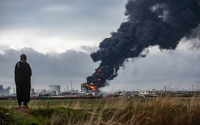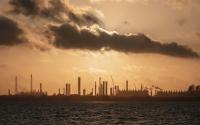22 August 2007Malaysia Sun / The Guardian
The speculative rush to develop gas and oil reserves under the Arctic ice could spell environmental catastrophe far beyond the pole.No one has a clue how much oil there is under the Arctic ice. Could be 1% of world's known reserves, could be 30%. When the US, or Russia, or Norway or anyone tells you that there's anough to keep the world going for years, they are flanelling. Few calculations have been done, and even those are bare estimates. Believe no one.And when the oil and mining companies say that their "cutting-edge" new technologies will make drilling for the black stuff, or anything else, in the high latitudes less likely to pollute the pristine wilderness, again do not believe them. The first rule of the environment is that where there is oil and industry, there will be accidents. In the last 18 months in Alaska alone, BP has spilt 267,000 gallons of crude, tankers have overturned, well-heads have blown, and the snow, tundra and waters have been contaminated across thousands of acres. It's been going on for years. The Exxon Valdez disaster in 1989 spilt nearly 11m gallons of crude, which mostly affected Alaska. Barely noticed was a Russian pipeline leak when nearly 380,000 gallons spilt in 1994. What is at stake is immense. On one level, the ecology there is far more vulnerable than more southerly ecosystems. Solar radiation speeds the breakdown of contaminants, so the reduced level of sunlight lengthens the degradation process. A shoreline habitat may take up to 30 years to recover from an oil spill, as opposed to perhaps five years in the tropics. Detection, monitoring and clean-up are all made harder in the Arctic cold.On another level, species like the polar bear, the arctic fox and the caribou, which are already threatened by contaminants being swept north in the air or on currents from industrialised countries, become scarcer and scarcer. But most importantly, any oil found there will be burned in cars or planes, or turned into plastic or any of the 10,000 other products made from oil, exacerbating climate change. It's already happening. For complex physical reasons, temperatures in the Arctic are rising faster than anywhere else on earth. Some scientists now openly fear the rapid demise of the icecap and the tundra - which ties up so much of the world's greenhouse gases - within our own lifetimes. Quite simply, the Arctic is the most precious of all environments. If it goes, we all go.






